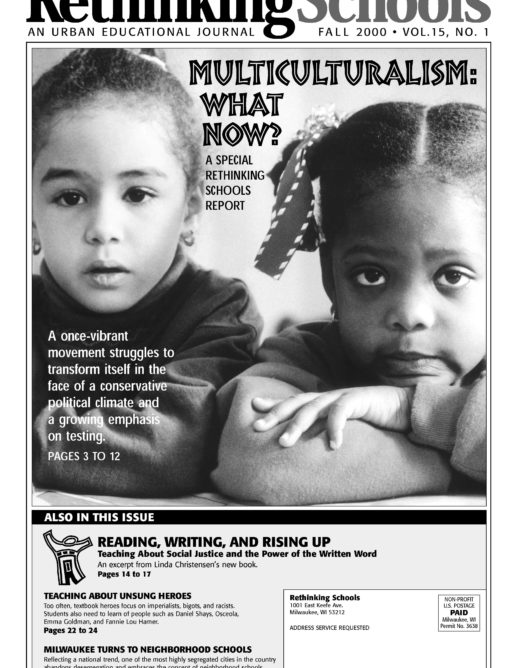Rethinking Schools
With this issue, Rethinking Schools begins its 15th year of publication. That’s no small feat for a non-profit periodical in today’s now-you-see-it-now-you-don’t publishing world. It is especially remarkable when we think back to our first issue – produced on a kitchen table with help from a temperamental Apple II-e computer. No paid staff. No budget.
Our initial mission was to prompt readers to rethink and reform Milwaukee public schools. We distributed 6,000 copies of our first issue, almost exclusively in the Milwaukee area. Today, we distribute an average of 40,000 copies of each issue to readers in every state and in 25 countries. We’ve also expanded our publishing to include books and, of course, a Web site.
While Rethinking Schools has grown and expanded, our philosophy remains grounded in a commitment to grassroots change, with a special emphasis on issues of equity and social justice. Throughout our history, we have also sought to base our vision of reform in the day-to-day realities of school life.
Another continuity that sustains Rethinking Schools is our link to educational and social justice activism. We’ve tried to be of use to the broader movement – to open our pages to the teachers, parents, students, community activists, and scholars who are working in myriad ways to create schools of and for justice.
To the extent that we’ve enjoyed our successes, they have been overwhelmingly the result of this activist commitment. Thus we would like to take the opportunity in this “birthday” editorial to offer a special thank you to the thousands of subscribers and contributors whose feedback and active support remind us that we all need each other to build a more just and equitable society.
ENDURING ISSUES
Unfortunately, many of the educational and social ills we wrote about in our early years continue to plague us. For example, the editorial in our second issue, “Rethinking Testing,” warned against “a school system in which tests have gone beyond measuring progress to effectively dictating the content and methods of instruction.”
Sound familiar? Our new book, Failing Our Kids: Why the Testing Craze Won’t Fix Our Schools, reveals how the current obsession with standardized tests is doing just that.
Similarly, that first year we wrote about schools’ failure to implement a multicultural and anti-racist curriculum. As one writer said in an early Rethinking Schools article, “In truth, we should be embarrassed that a special time must be set aside to focus on Black history. Yet, the reality is that the ‘official’ history taught in the schools, in general, fails to reflect the many contributions of people of color.”
We may have new heroes and holidays, but we should still be embarrassed by schools’ failure to teach a more critical, diverse, and honest curriculum. Multiculturalism is an issue that remains as important as ever. We are pleased that we are able to present a special report in this issue on the current state of multicultural education.
For 15 years, Rethinking Schools has been a vigorous critic of many of the practices of our nation’s schools. We nonetheless remain deeply committed to a free, secular public school system as the cornerstone of what we imagine our country could become: a real multiracial democracy.
– – –
We are pleased to announce that as we begin our 15th year of publication, two new books are available from Rethinking Schools Press.
Reading, Writing, and Rising Up: Teaching About Social Justice and the Power of the Written Word will be available in November. This 196-page book, by veteran teacher Linda Christensen, is an inspiring collection of essays, lesson plans, and student writing – all grounded in an unwavering focus on language arts teaching for justice.
Our other new book, Failing Our Kids: Why the Testing Craze Won’t Fix Our Schools, is a 148-page collection of more than 50 articles by teachers, parents, students, and activists. The book, now available in bulk copies for as low as $4 each, is edited by Kathy Swope, a Rethinking Schools editor, and Barbara Miner, managing editor of Rethinking Schools.

